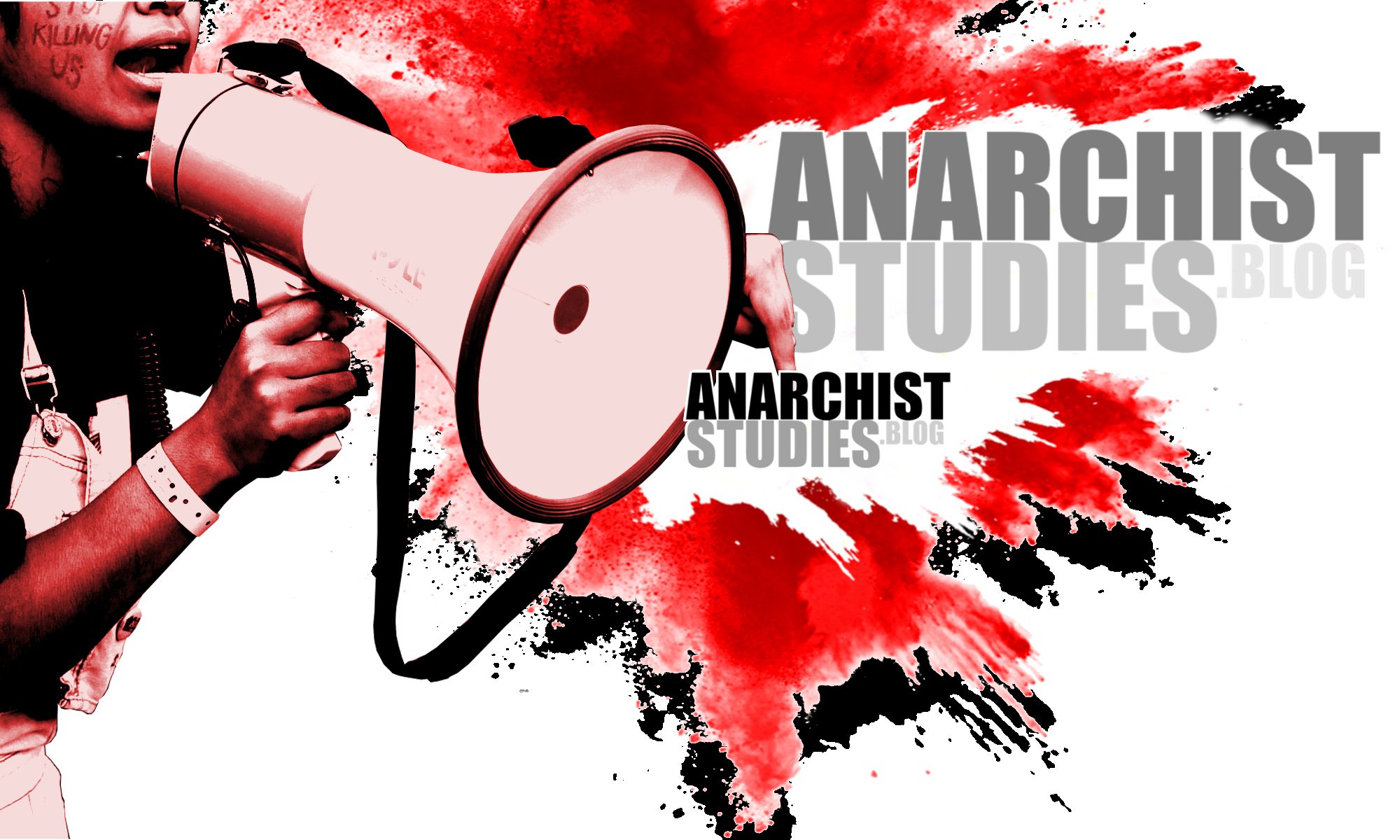by Ahmed Julien Saade
13th November 2019
“If it were to rain freedom from the skies, you would watch the slaves holding umbrellas…”
(Lebanese Saying)
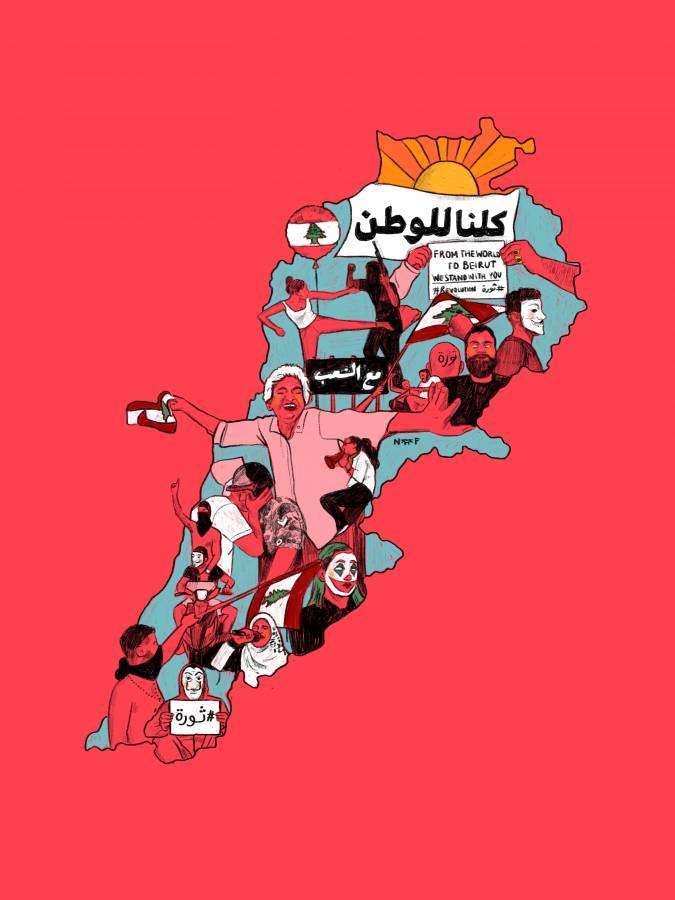
Introduction
As I write this paper, Lebanese masses are in the streets, in families, demanding change, ordering the political elite, in its entirety, to leave – all in a peaceful manner. Proud of their unity, they call it a revolution, but I argue that it is nothing more than a mass gathering. They expect change, a step towards a brighter future, but things will only be worse for they will be disappointed, and their disappointment will further push them into despair, into a crisis of confidence and pessimistic beliefs. The Lebanese political and economic elite is made of liars, thieves and murderers, and such people do not change. An oppressor knows when to oppress, and they still will in Lebanon for they still can. People continue to die at their hands, every day, but it would seem that the human life has lost its value in Lebanon, which echoes Karl Heinzen when he writes
“The reaction has only tools, the revolution alone has martyrs. But the despots have robbed you even of this advantage: they have innumerably increased the martyrs, so that martyrdom has become entirely meaningless”.
(Heinzen [1853] 2010, 161)
In this essay, I will describe the contemporary Lebanese model of oppression, which, as I will argue, is both optimal in its exploitative methods and ideal in sustaining a minimally effective possible popular reaction. More specifically, I will discuss each measure by which the state, consciously or not, anticipates and prevents any possible uprisings, be they of anarchist nature or any other libertarian origin.
Brief Historical Overview
While it is of no large importance to dig deep into the country’s history, a brief recount of the main events that precipitated the current outlook is necessary. Towards the end of the last century, a civil war of considerable damage brought Lebanon to the spotlight. In spite of the sectarian turn the conflict took, and the ethnic cleansings that come to mind when recalling this page of history, the origin of this war was no more than a social class struggle opposing leftists and the right. Interestingly, even Lebanese people forget why the anti-state actions initially started, as their memories converge towards the atrocities that unraveled during the conflict. Indeed, it is said that no Lebanese family was left unaffected; that families took turns in mourning their loved ones.
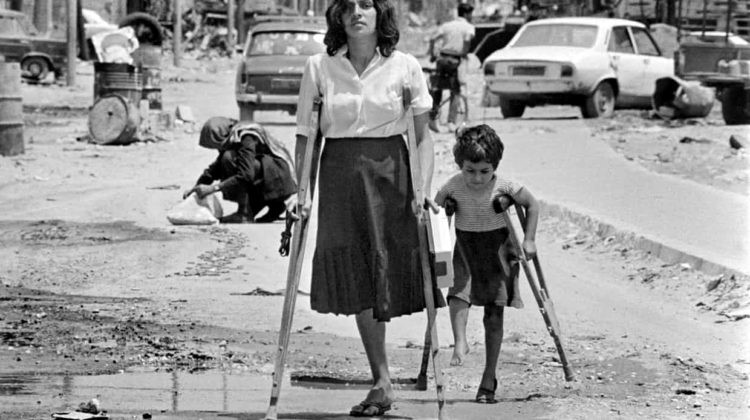
Eventually, the war ended, a sectarian political structure was agreed, and leaders from all parties secured roles in government. These leaders still run the country today, oppressing the masses that once fought for them, masses they claim to represent, a perfect illustration of Kropotkin’s idea that nothing has changed but “the people who manage” the system (Kropotkin [1912] 1970, 186; Van Der Walt 2013, 344).
The country is run by some of the most “successful” and richest capitalists in the Middle East. Even the leader of the so-called socialist party is a millionaire who simply inherited his political role. Consequently, with no actual leftist movement in the country, a capitalist culture is predominant, further increasing social polarization. The Lebanese popular saying “the poor is poor by his own hands” illustrates the deep-rooted mentality that was cultivated by the elite. Accordingly, this culture is pushing individuals to resort to unethical and illegal ways of generating income, in the sole hope of increasing their social status and become part of the elite.
Current Events

Corruption comes at an economic cost. Long-term, large scale and unpunished corruption causes economic crisis. Indeed, such is the case in Lebanon today, where flagrant inequality is widening, poverty is increasing, the middle-class is ever shrinking, and a disastrous economic outlook is unfolding. The elite has turned the country into a capitalist corporation, with political parties as shareholders, and with shareholder wealth maximization as the sole objective. Today, this corporation’s workers (not to say slaves), the country’s population is on strike. People are in the streets, demanding the ousting of all the political class.
This popular movement makes use of different means, all of a peaceful nature, to show its discontent and reach its objectives: Road blockages, mass gatherings, labour strikes, insulting chants, social media pressure among others. Some are dancing in the streets, others are teaching their children how to protest (schools are closed). In short, it is a non-violent movement, one that is generating a large amount of funny content (posted online), which is ironic considering the seriousness of the problem at hand.
Interestingly, so far, these protests have been partly fruitful; the prime minister has announced his resignation, some of the announced taxes have been cancelled, and the formation of a new and “better” government is on the agenda. Nevertheless, is this enough? Is this the change demanded by the masses, the way to democracy and emancipation? I argue for a negative answer. The regime’s corrupt web is too large and complex for such uprisings to enable any radical change.
Pillar 1: Propaganda and the Illusion of Choice
There is a handful of privately owned television stations, between which the population has the “privilege” to choose (the state’s official station is of no importance in this section, for it is unpopular among the Lebanese audience). Interestingly, each of these media outlets is owned by a politician or one of his close connections. By omitting information that negatively reflects on the channel owner’s political family, these stations become no more than propagandist outlets aiming to distort popular opinion and obscure reality.
The role of these media stations, however, is much more complex in its perversion. In their simultaneous dissemination of radically different fictional realities, they give to the masses the illusion of:
- being part of a democratic system that encourages critical thinking with open access to information,
- there being a political figure that is striving for their rights against opposing parties and,
- the necessity to support the lesser of two evils, in fear of chaos.
Consequently, and unconsciously, the people do not reflect on emancipation for they believe that a portion of the elite is protecting them from “the other”. The Lebanese masses have become slaves to irrational logic, a logic introduced by the elite. Such is the vicious circle where propaganda traps them, a circle of fear, ignorance and acceptance of the status quo.
“Slaves…Spit on them, they’ll say it’s raining.”
(Lebanese Saying)
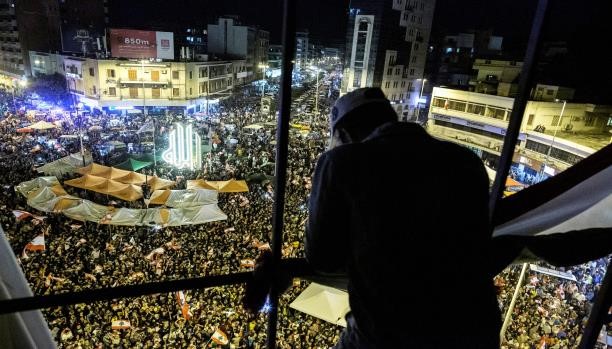
Pillar 2: Aspiration Manipulation
Appadurai (2004) describes how development increases populations’ aspirations. In Lebanon, however, the state discriminates against some areas when deciding on large investments. The North of the country for example, arguably one of the poorest territories in the region, is largely deprived from large investments. Consequently, in this perimeter, citizens have lower aspirations than their counterparts do in other areas of the country. In my recent research, I have measured the differences in income aspirations between Tripolitans (North) and Beirutis (Capital). For the same level of education, age, or gender, the Tripolitan subgroups consistently had lower income aspirations, with an average of $500 (USD) difference for the entire sample.
This geographic discrimination further shatters the masses’ unity, and hence the potential revolutionary movement, by creating unnecessary geographic conflicts and sectarian tension. Ray and Mitra (2013) illustrate a similar situation – in applying their economic theory of conflict on Hindu-Muslim violence in India, they find that “an increase in Muslim well-being” led to greater violence towards this community.
A corrupt state benefits from lowering the “dangerous” masses’ aspirations. Firstly, the vicious circle between low aspirations and poverty has been repeatedly proven (Czaika and Vothknecht 2014; Dalton, Ghosal and Mani 2015; Dalton, Gonzalez Jimenez and Noussair 2017). Moreover, the effects of poverty on behavior have also benefitted from many researchers’ attention. Mani et al. (2013) summarize these effects in an efficient manner when they write, “poverty impedes cognitive function”. Logically, this helps the state sustain its grasp of power.
Furthermore, an increase in aspirations would be a direct threat to the state’s existence. Indeed, as one’s aspirations increase, her aspiration window widens. Practically, this means that the individual’s cognitive zone is enlarged, enabling a better vision and understanding of the higher class’s social status, thus of injustice. In his paper on socially determined aspirations, Debraj Ray refers to a page of history much useful to illustrate this threat:
“As Alexis De Tocqueville observed of the French Revolution: ‘[t]he French found their position insupportable, just where it had become better…’ and indeed ‘[i]t is not always that from going from bad to worse that a society falls into revolution’”.
(De Tocqueville 1856 in Ray 2016)
We can thus deduce that by limiting the country’s development, by alienating certain groups and by sustaining an important rate of poverty, the state is actually hindering people’s aspiration formation process, in the aim of minimizing the risk of a possible revolution.
Pillar 3: Politicizing the Youth
In many countries, revolts find their origins in universities, where the next generation of workers foresees its future aspiration’s failure, thus acts to prevent it. A predominant example of such activism can be found in France, where conflict between students and the state is relatively frequent. It would seem, however, that the Lebanese elite has anticipated this problem. I myself do not believe that the Lebanese party leaders have the intellectual capacity to anticipate such an issue, but rather that they address it coincidentally, through a battles of egos. Indeed, in the most prestigious universities of the country, elections for students’ representatives take place annually – opposing candidates belonging to different political parties. Those elections are of considerable perceived importance, as evidenced by the fact that results are retransmitted on the news.

We must note, however, that such elections do not occur in public schools, perhaps out of fear or carelessness considering that these schools are mostly attended by the less-privileged. Assuming that the elite has the intellectual capacity to think as follows, it could be argued that upon the realization that poorer people have lower aspirations, the threat of aspiration failure, the trigger to social uprisings among the youth, is minimal, thus neglecting the need to politicize students in public schools (Ray 2006; Dalton, Ghosal and Mani 2015).
In all cases, by politicizing the youth, the state is actually limiting the danger they could represent. Theoretically, politicians are minimizing the potential of a “counter-culture” current that could challenge the state and its legitimacy (Van Der Walt 2013, 342).
Pillar 4: Taming Syndicates and Unions
While workers’ unions’ and syndicates’ primary function is to protect and reinforce their members’ rights against both the state and capital, they are mostly useless and ineffective in Lebanon, and for obvious reasons. Syndicalism as a theory dictates a bottom-up democratic approach to both administration and production, whose goal is to build the necessary “counter-power” to fight for concessions (Van Der Walt 2013, 342). In Lebanon, however, it is the elite, via its political parties, that nominates candidates to represent these unions. More astonishingly, alliances between presumably opposing parties are often formed to nominate a winning candidate.
While the voting process is indeed a bottom-up one, it would be naïve to assert that this structure could ever truly defend workers. Subsequently, syndicates and unions in Lebanon have only one real nature – they are the battleground of egos (again) between the different elitist groups. I am tempted to believe that this elite’s logic has gone so astray in its illusions of grandeur that once its candidate wins, a genuine belief of being popular emerges, further strengthening its will to hold on to power and its conviction of being the legitimate ruler.
Bakunin, Malatesta and any other syndicalist ideologists would surely blush at the sight of the so-called Lebanese syndicalist actions: strikes on holidays, opposition from within and oftentimes surrendering to government pressure without any concessions (thus setting a precedent of weakness). Yet again, what actions can we realistically expect considering the syndicalist representatives’ affiliation to the governing elite?
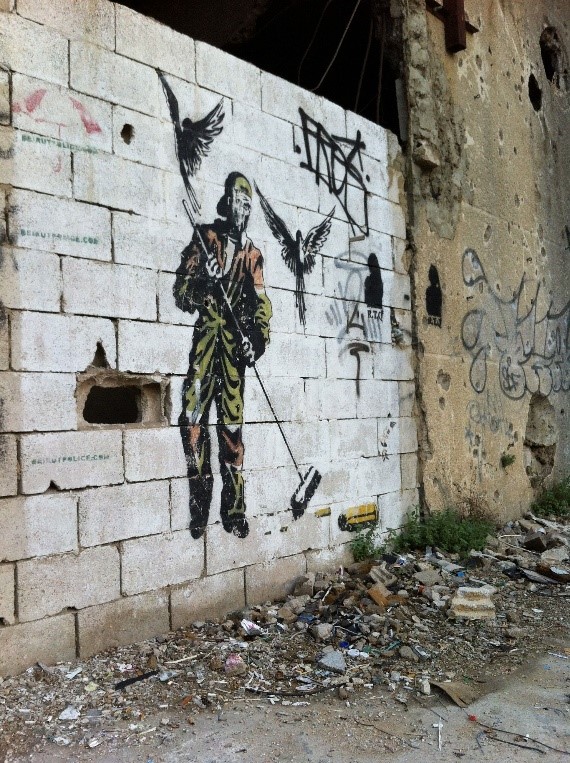
Pillar 5: Coalition as the Optimal Exploitative Structure
During elections, leaders with presumably contradictory ideologies form alliances to guarantee their seats in parliament. The very voting process and electoral laws are structured in a way that minimizes the chances of new candidates, from the masses, of becoming official representatives of the people. I do not venture into the alleged treacheries that occur when counting votes, for I cannot build my analysis on unproved rumors, as strong and real as they might be. Nevertheless, I would not be taking any risks in asserting that the electoral process is corrupt, flawed and undemocratic.
After “winning” their parliamentary seats, opposing parties of the country divide the executive roles between themselves, just like pirates split treasure. This analogy is not an exaggeration, for indeed they take months to negotiate and agree on the ministerial positions each party will obtain, stagnating the country’s economy and development in the process. The resulting coalition, most of the time, has unqualified individuals in critical roles, or ministers who previously held completely unrelated jobs (for example, from Minister of Sports to Minister of the Interior). However, while completely inapt to develop the country and bring prosperity, this structure is optimal in exploiting the masses, as I will now describe.
Firstly, a coalition protects officials and single parties from any possible sharp loss in popularity. Indeed, with the repetitive showdown of economic failures, primarily due to corruption, ministers and political parties get to blame their partners in the coalition, hence preserving their legitimacy in the eye of the myopic public. Moreover, this blame game further strengthens the popular division as, in turn, people accuse “the other” of ruining the country. This division, necessary to the oppressor’s prosperity, is a perfect illustration of how the masses can fall slaves to irrational logic, a logic exogenously and strategically, through suggestibility, introduced by the state (I use the term “suggestibility” in reference to Pierre Janet and Hippolyte Bernheim’s work in using suggestion to treat their hysteric patients).
Furthermore, this coalition allows for efficient coordination between the looters who, in spite of their alliance, remain suspicious of each other. Consequently and together, they can take decisions such as the unethical recruitment practices in the public sector, the protection of the distorted banking industry, the intimidation of judges and legislators, setting the appropriate bribe levels, and the overall exploitation of the country’s public assets. It is also worthy to note that the Central Bank’s governor, an ex-investment banker, does extremely well in keeping obscurity around the country’s banking activities. Finally, via this centralized power, politicians also influence the country’s clergy (from all religions) who often seem to preach for the words of their “new gods”. In short, such a coalition is an optimal model of sustainable governance.
What Next for the Uprisings?

The crowds are losing patience, and patience is necessary for a peaceful “revolution”. Indeed, unlike a scenario of direct and violent confrontation where change is usually radical and possibly fast, a peaceful movement requires more time to reach its objectives. The movement in Lebanon is under increasing pressure, primarily of an economic nature, but also in the shape of social frustration. With banks imposing restrictions on cash withdrawal, with businesses closed, a fuel crisis, and hospitals facing shortages of all types, the protesters are progressively appearing as a burden to normal life. Undoubtedly, the government will make small changes, which will further increase the divisions between the masses with some saying “we won” and others saying “not enough”, causing the downfall of the revolution with it. Soon, some of those protesters will even forget the reason they took to the streets.
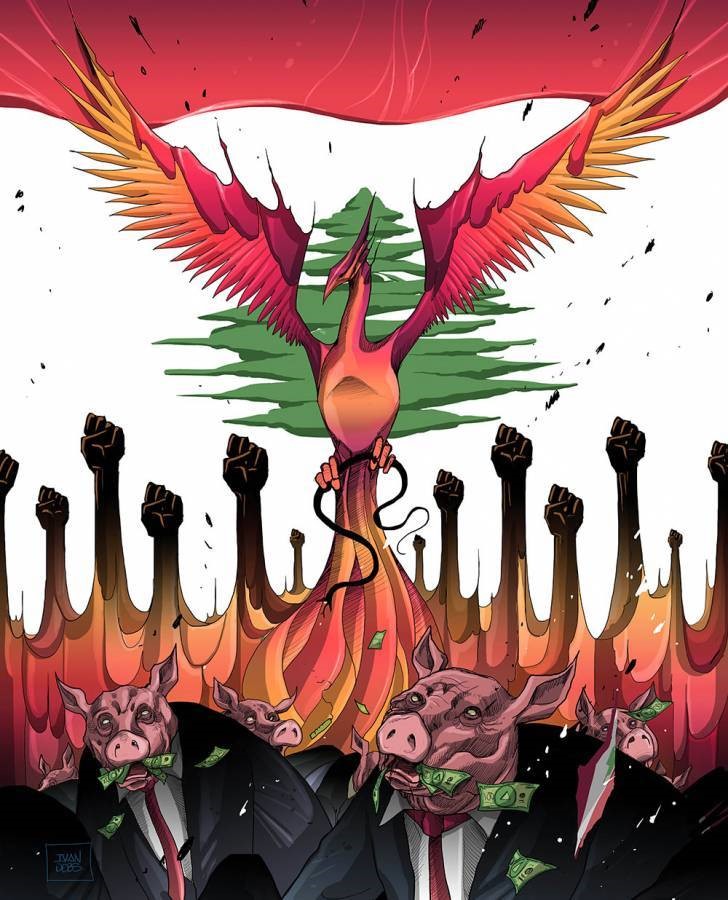
A Note on Culture
It is my deepest conviction that there is no such thing as a cultural predisposition to democracy and freedom. Culture changes fast, especially with economic development. Ha-Joon Chang perfectly illustrates this capacity to change when he describes how the Japanese were once stereotyped as lazy and the Germans as clowns (in contradiction with today’s predominant views).
Nevertheless, culture affects the pace at which change occurs. Today, the average Lebanese citizen cannot imagine an equal society, free of corruption, where officials would be from the people, accountable to the people. Deep inside their minds, buried in their subconscious, inferiority resonates. The only equality they aspire to is an unequal one. It is in their culture, the dogma that:
“All animals are equal, but some animals are more equal than others”.
(Orwell 1945)
Concluding Remarks
“It is by and because of the direct acts of the forerunners of social change, whether they be of peaceful or warlike nature, that the Human Conscience, the conscience of the mass, becomes aroused to the need for change”.
(De Cleyre 1912)
A large portion of the Lebanese population would not embrace this quote by the brilliant Voltairine De Cleyre, only due to its “warlike” component. Memories of the civil war, the fear of repression by political parties’ militias, and more generally, aversion to the unknown are all reasons for their dislike of a violent conflict.
By no means must it be assumed that I am advocating a violent and bloody uprising. I am simply asserting that for emancipation to be full, for liberty to be complete, the entire political elite must go away, in accordance with anarchist literature. Throughout this essay, I have argued for a pessimistic outlook in the short run, contrary to the hopes raised by the current movement in the country. I further defend this deduction on the population’s unwillingness and unpreparedness for a full confrontation, paralleled by the state’s insouciance with regards to peaceful activism. Consequently, and considering the size and complexity of the corrupt “web” this state has created around itself to discourage the masses from revolting; I believe that the status quo will remain as is.
References
Appadurai, A. (2004), ‘The capacity to aspire,’ in Culture and Public Action, ed. By M. Walton and V. Rao. Stanford, CA: Stanford University Press.
Bessner, D. and Stauch, M. (2010), ‘Karl Heinzen and the intellectual origins of Modern Terror,’ Terrorism and Political Violence, vol. 22, pp. 143-176.
Chang, H. (2007), ‘Bad Samaritans: Rich nations, poor policies and the threat to the developing world,’ Random House, London.
Czaika, M. and Vothknecht, M. (2014), ‘Migration and aspirations – are migrants trapped on a hedonic treadmill?,’ IZA Journal of Migration, vol. 3, pp. 1-21.
Dalton, P., Ghosal, S. and Mani, A. (2015), ‘Poverty and aspirations failure,’ The Economic Journal, vol. 126, pp. 165-188.
Dalton, P., Gonzalez Jimenez, V. and Noussair, C. (2017), ‘Exposure to poverty and productivity,’ PloS one, vol. 12, e0170231.
De Cleyre, V. (1912/2004), ‘Direct action,’ A.J. Brigati Ed., The Voltairine de Cleyre reader, pp. 47–61. Oakland, CA: AK Press.
De Tocqueville, A. (1856), ‘L’Ancien Régime,’ From Alexis De Tocqueville, Démocratie en Amérique, L’Ancien Régime et la Révolution, Paris: Robert Laffont, 1986.
Kropotkin, P. (1912/1970), ‘Modern Science and Anarchism,’ R.N. Baldwin Ed., Kropotkin’s Revolutionary Pamphlets: a collection of Writings, pp. 145-194, New York: Dover.
Mani, A., Mullainathan, S., Shafir, E. and Zhao, J. (2013), ‘Poverty impedes cognitive function,’ Science, vol. 341, pp. 976-980.
Mitra, A. and Ray, D. (2014), ‘Implications of an economic theory of conflict: Hindu-Muslim violence in India,’ Journal of Political Economy, vol. 122, pp. 719-765.
Orwell, G., (1946),’Animal Farm,’ The New American Library, New York. pp. 112.
Ray, D. (2006), ‘Aspirations, poverty and economic change,’ in Understanding Poverty, ed. By R. Benabou, A. Banerjee, and D. Mookherjee. New York: Oxford University Press.
Ray, D. (2016), ‘Aspirations and the development treadmill,’ Journal of Human Development and Capabilities, vol. 17, pp. 309-323.
Saade, A.J. (2019), ‘Revolutionary Leadership,’An-Nahar, Beirut, 3 November. Available at: https://en.annahar.com/article/1061502-revolutionary-leadership (Accessed: 9 November 2019).
Saade, A.J. (2019), ‘Steps towards Lebanese emancipation,’An-Nahar, Beirut, 30 October. Available at: https://en.annahar.com/article/1058535-steps-toward-lebanese-emancipation (Accessed: 7 November 2019).
Van Der Walt, L. (2013), Anarchism/Syndicalism as a vision, strategy and experience of bottom-up socialist democracy: a reply to Daryl Glaser,’ Politikon, vol. 40, pp. 339-349.
